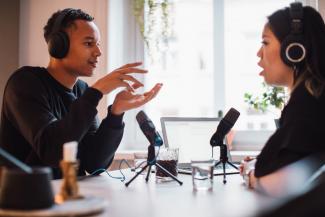
Do the preparation task first. Then listen to the audio and do the exercises.
Preparation
Transcript
Presenter: So, today's expert teacher is Gabriella, a university English teacher from Leeds. Gabriella, hi and thanks for joining us today.
Gabriella: Thanks for having me!
Presenter: So, I have to confess today's topic is something I am really bad at: listening. Most people say speaking is the most stressful part of learning a new language but, for me, with my B1 German, speaking isn't so bad. At least I'm in control of it. But listening … woah … people speak so fast and it's like my brain just shuts down. Am I just really strange and bad at listening? Tell me, honestly, I can take it.
Gabriella: No, you're not strange. In fact, it's really common. You know, in exams most people do pretty well in speaking compared with listening. Of course, exams are a different situation from real life because in an exam you can't ask for something to be repeated or explained. You usually have just one or maybe two opportunities to listen to the dialogue and then it's gone.
Presenter: Right, but in real life I feel stupid always saying, 'Sorry, can you repeat that, please?', especially if I still don't understand even when they repeat it. And people out there listening, I hope you don't do this – quite often the person just repeats what they said equally as fast and I'm still lost!
Gabriella: They do, don't they? In real life, you've got two strategies. One is to pretend to understand and get out of the conversation as fast as you can.
Presenter: Yep, sounds familiar!
Gabriella: But, obviously that's not going to help if it's a conversation with high stakes. It might have important consequences. I mean, if you're just chatting with a stranger at the bus stop, it doesn't matter. But imagine you're at a government office or a bank, trying to find out what paperwork you need to get your ID or open a bank account. What can you do then?
Presenter: I hope you've got the answer, Gabriella, because I'm coming out in a cold sweat just thinking about either of those situations!
Gabriella: The other strategy is to summarise what they said.
Presenter: But how can you do that if you didn't understand what they said?
Gabriella: Ah, well, you only start the summary, so you might say, in German in your case, 'OK, so the first thing I have to do is …?' and make it a question. Or, for example, 'And which office is that again?' Break it down into smaller questions and the other person will naturally start answering them. That way you're controlling the conversation a bit more.
Presenter: I get you ...




Hello Айжан
Could you please write your username using Roman letters (that is, the letters that English uses)? That way we can all pronounce your name.
Thanks in advance.
All the best
Kirk
The LearnEnglish Team
Hello Anji Ghattas
That's actually very normal! When we listen or read, we don't have to produce any language -- we see or hear it and then can work out the meaning. Speaking and writing are different, because we have to arrange the words and phrases ourselves, which is more difficult.
I'd encourage you to choose eight to ten phrases or sentences from this page that you think would be useful in your speaking, either because they are difficult to pronounce or because they could be useful in different conversations. For example, 'So, I have to confess today's topic is' or something similar could be useful in a wide range of situations.
Practise saying that phrase over and over again until it's easy to say. Check your pronunciation with the recording. Then do the same thing with the other phrases or sentences you've chosen. Do this a couple of times a day for several days, until you can remember and say them all confidently.
Write them down in a notebook and then choose another set of sentences from another listening and follow the same procedure. Gradually, you will build up your speaking fluency and vocabulary, and improve your pronunciation and listening.
Let us know how you get on with that!
All the best
Kirk
The LearnEnglish Team
Hello micaela
I hope you find these pages useful. I just wanted to let you know that, in addition to this Listening section, there are a lot of other resources you could use to improve your listening in our General English section: Video zone, Audio zone, Podcasts, Big City Small World and more.
Best wishes
Kirk
The LearnEnglish Team